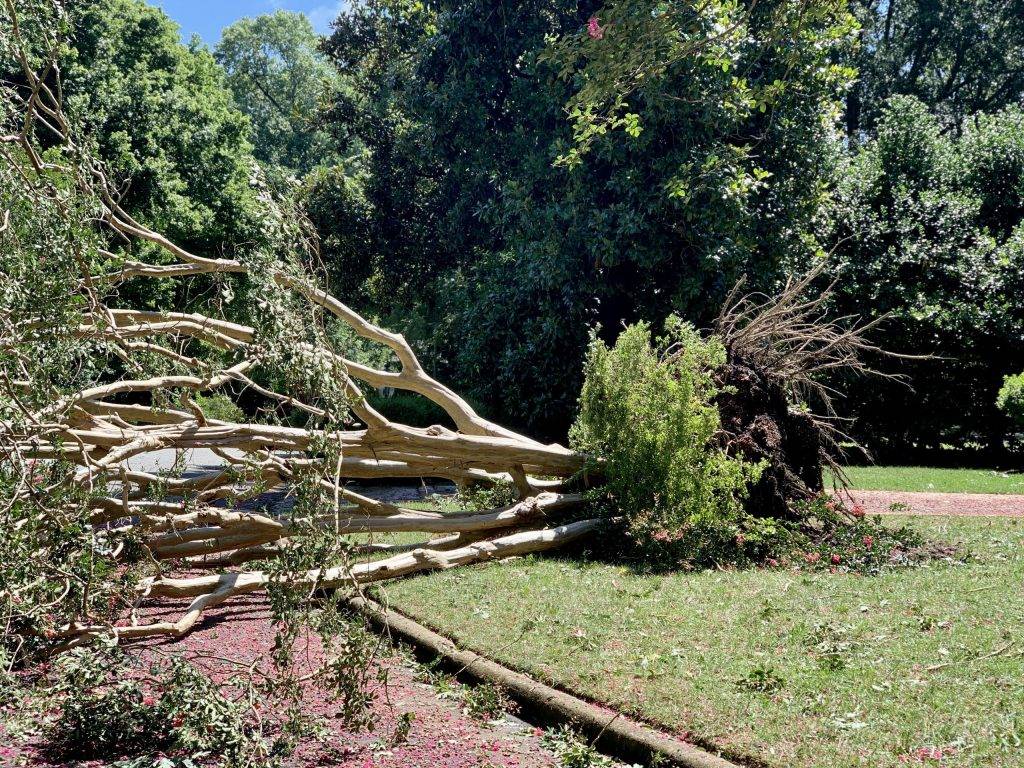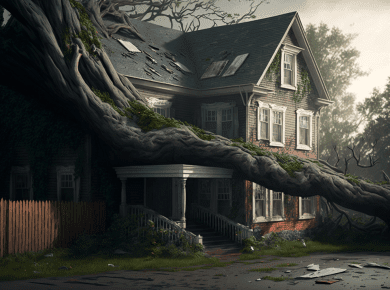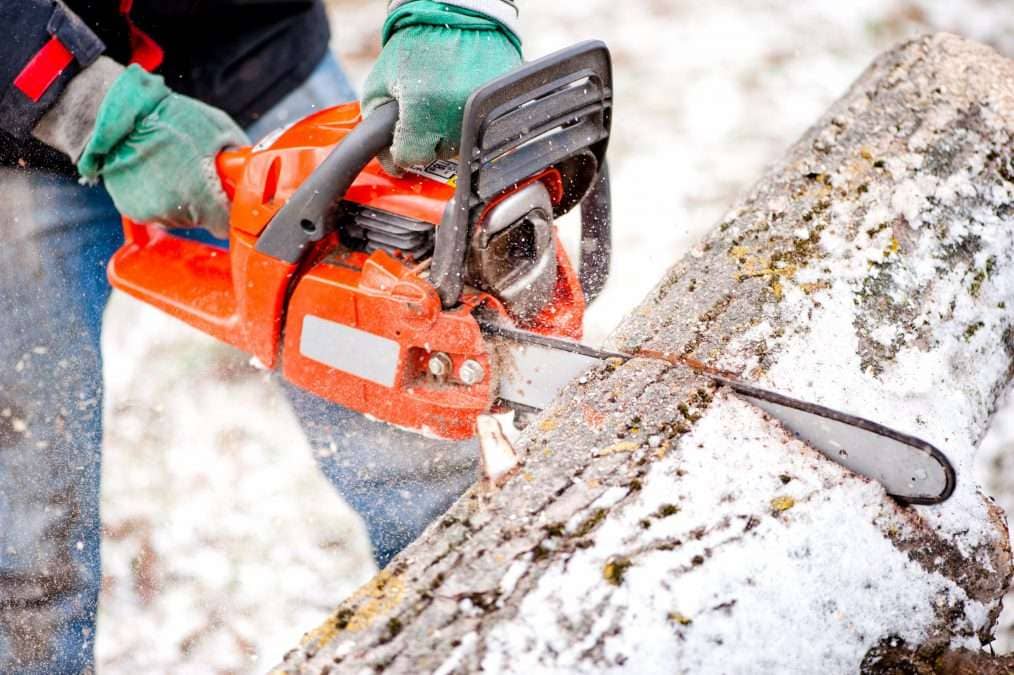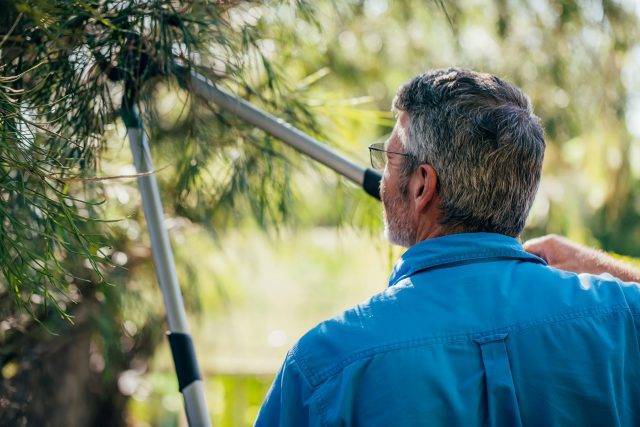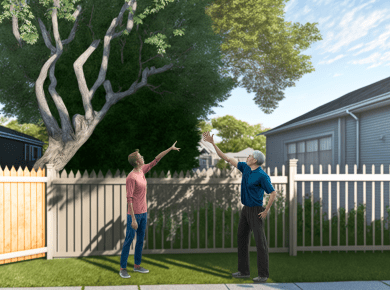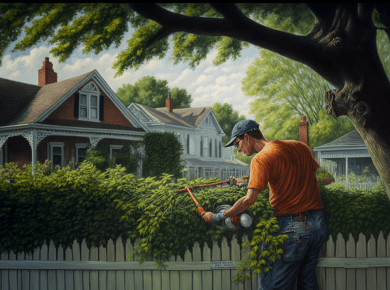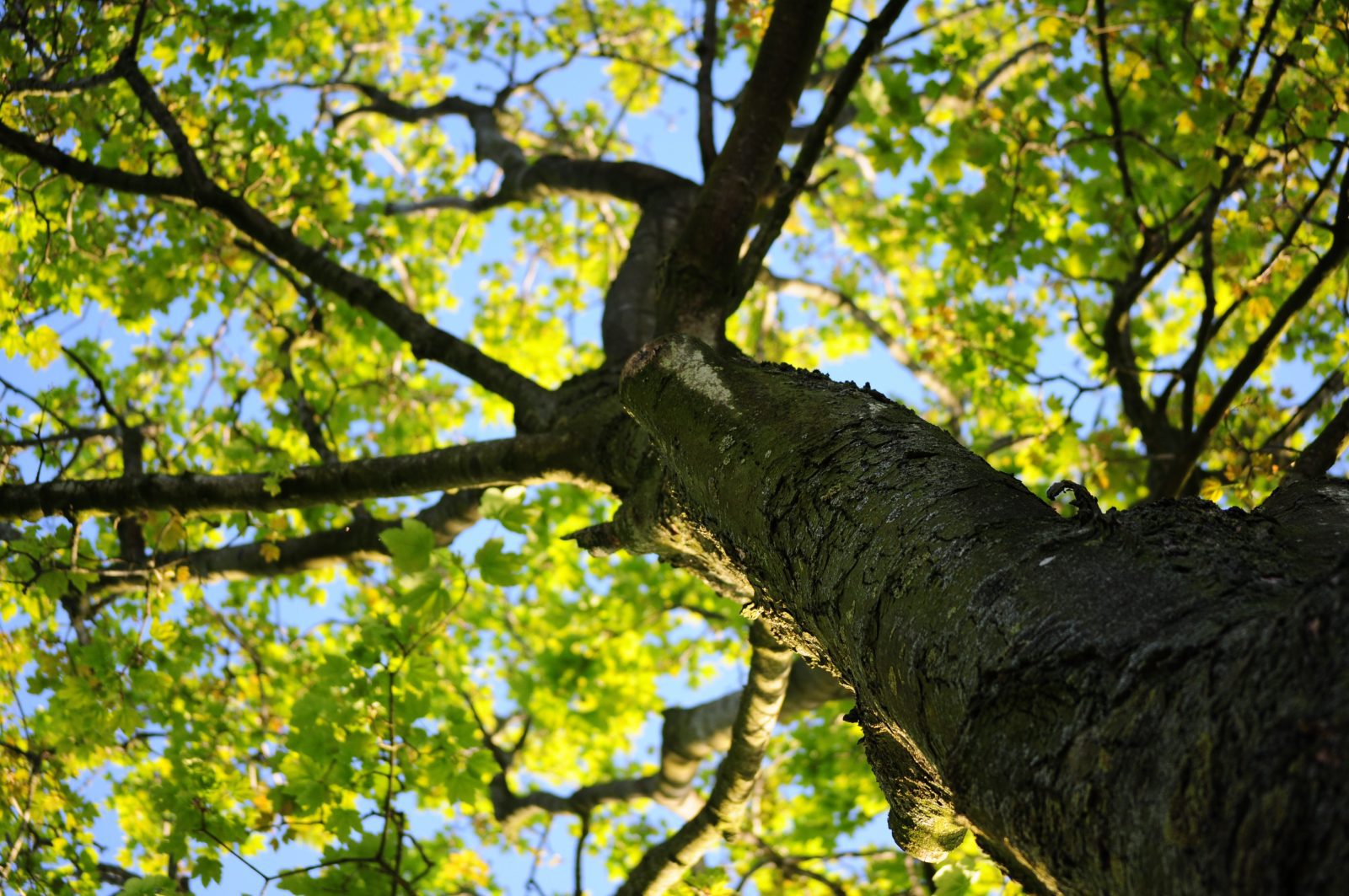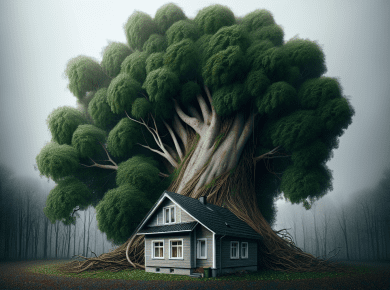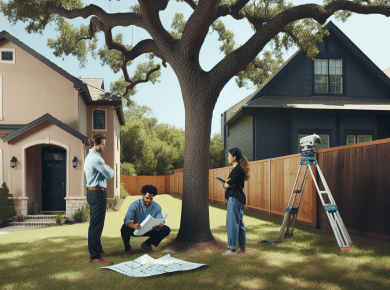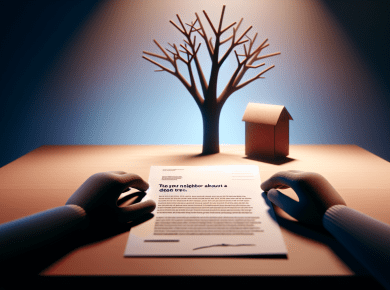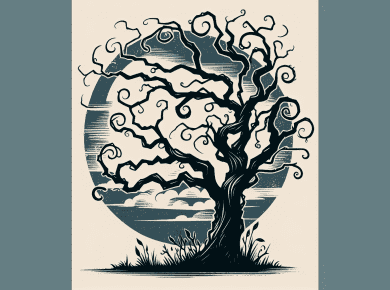If a tree falls on your property, you may be wondering who is responsible for removing it. While trees are an important part of our communities, they can also cause problems when they fall or need to be removed for safety reasons.
Commons reasons for a fallen tree
First, let’s take a look at the types of situations that may require fallen tree removal:
- Storm damage: Trees that are damaged or toppled by storms or other natural disasters may need to be removed for safety reasons.
- Diseased or damaged trees: Trees that are diseased or have significant structural damage may need to be removed to prevent further damage or injury.
- Overgrown trees: Trees that have grown too large or have overhanging branches may need to be trimmed or removed to protect nearby property.
Who is responsible for fallen tree removal?
So, who is responsible for fallen tree removal? Here are some factors to consider:
- Ownership of the tree: If the tree is on your property, you are generally responsible for removing it. However, if the tree is on your neighbor’s property but is causing damage to your property, your neighbor may be responsible for removing it.
- Cause of the tree falling: If the tree fell due to natural causes (such as a storm or disease), the responsibility for removal may depend on the ownership of the tree. If the tree is on your property, you will likely be responsible for removal. If the tree is on your neighbor’s property but fell due to natural causes, your neighbor may be responsible for removal.
- Ordinances and agreements: Some cities and towns have ordinances that regulate the removal of fallen trees. Additionally, you may have an agreement with your neighbor (such as a homeowner’s association agreement) that specifies who is responsible for tree removal.
If you’re unsure who is responsible for fallen tree removal, it’s a good idea to consult with an attorney.
An attorney can help you understand your rights and options and assist you with any legal issues that may arise.
Who is responsible for removing a fallen tree from a public road?
If a tree falls and blocks a public road, it is typically the responsibility of the government or municipality to remove it.
This may be the city, county, or state, depending on the location of the road.
In some cases, the power company may also be involved in the removal process if the fallen tree has caused damage to power lines.
Who pays for the removal of a fallen tree on private property?
If a tree falls on private property, the property owner is typically responsible for its removal.
The cost of removal can vary depending on the size and location of the tree, as well as the extent of the damage it has caused.
In some cases, the property owner’s insurance policy may cover the cost of tree removal. It is a good idea to check with your insurance company to see what is covered under your policy.
Who’s responsibility is it if I am renting?
If you are renting a property, whether it is a house or an apartment, the responsibility for fallen tree removal would typically fall on the landlord or property owner. However, it is always a good idea to check your lease or rental agreement to see if it specifies who is responsible for tree maintenance and removal.
Additionally, if the tree falls due to a storm or other natural disaster, the responsibility for removal may fall on the landlord or property owner.
It is always best to check with your landlord or property owner to find out who is responsible for fallen tree removal.
When Does Homeowners’ Insurance Not Cover Fallen Trees?
Homeowners’ insurance typically covers damage caused by fallen trees, but there are some circumstances under which it may not. Some of the situations where homeowners’ insurance may not cover fallen tree damage include:
- Neglect: If a tree on your property falls due to neglect, such as not properly maintaining it, your insurance may not cover the damage.
- Act of God: If a tree falls due to a natural disaster such as a hurricane or tornado, it would be considered an “act of God” and would not be covered by your homeowners’ insurance. -Flooding: If a tree falls due to flooding, which is usually not covered by standard homeowners’ insurance policy.
- Liability: If a tree on your property falls and causes damage to a neighbor’s property, your homeowners’ insurance may not cover the damage and it would be your responsibility.
It’s always a good idea to check your insurance policy to see what is covered and what is not. If in doubt, you can always contact your insurance company to find out if they will cover damages caused by a fallen tree.
What if a fallen tree causes damage to a neighbor’s property?
If a fallen tree on your property causes damage to your neighbor’s property, you may be liable for the damages.
Your neighbor may file a claim with your insurance company or seek compensation from you directly. In some cases, it may be necessary to involve an attorney or mediator to resolve the issue.
What if a fallen tree is blocking access to my property?
If a fallen tree is blocking access to your property, you may need to take steps to remove it as soon as possible.
Depending on the location of the tree and the extent of the damage it has caused, you may need to hire a professional tree removal service to take care of the problem.
If the tree is on public property or is blocking a public road, you may need to contact the government or municipality to request assistance.
Can I be held liable if a tree on my property falls and causes damage to someone else’s property?
In some cases, you may be held liable if a tree on your property falls and causes damage to someone else’s property. This is because property owners have a legal obligation to maintain their property in a safe and well-maintained condition.
If a tree on your property is in poor health or poses a risk of falling, you may be required to take steps to address the issue.
If you fail to do so and the tree falls and causes damage to your neighbor’s property, you may be held liable for the damages.
Understanding your options
If you need legal guidance on fallen tree removal or any other property-related issues, we recommend reaching out to us.
We can connect you with an experienced attorney in your area who can help you navigate the legal process and fight for your rights.
Preventing Future Fallen Trees
Fallen trees can cause a lot of damage, both to your property and to the surrounding community. In addition to the immediate damage caused by a fallen tree, there are also long-term consequences that can impact your property value and the safety of your neighborhood. Fortunately, there are steps you can take to prevent future fallen trees, and protect your property, your family and your community.
One of the most important things you can do to prevent future fallen trees is to regularly inspect the trees on your property. This includes looking for signs of decay, disease, or damage, such as cracked or hollow trunks, dead branches, or discolored leaves. If you notice any of these signs, it’s important to call a professional arborist to assess the tree and determine if it needs to be removed.
Another important step in preventing future fallen trees is to properly maintain your trees. This includes regular pruning, fertilizing, and watering. Properly maintained trees are less likely to fall and cause damage, and they will also be healthier and more attractive.
Another aspect to consider is where the tree is located. Trees that are planted in close proximity to buildings, power lines, and other structures are at a higher risk of falling and causing damage. Therefore, it’s important to plant trees in appropriate locations, and to regularly assess their growth and potential risk.
In addition to taking care of the trees on your property, it’s also important to be aware of the trees in your community. If you notice a tree on public property that looks like it might be at risk of falling, it’s important to bring it to the attention of the appropriate authorities.
Another important step in preventing future fallen trees is to prepare for natural disasters, such as storms, hurricanes, or tornadoes. These events can cause even healthy trees to fall, so it’s important to have a plan in place to protect your property and your family in the event of a natural disaster. This includes securing loose objects, such as outdoor furniture, and having an emergency kit on hand.
In conclusion, preventing future fallen trees requires regular inspections, proper maintenance, appropriate planting, community awareness and being prepared for natural disasters. Taking these steps will not only protect your property, but also the safety of your neighborhood. Remember to also check with your local government for specific information about fallen tree removal in your area and to contact a professional arborist if you suspect a tree is at risk of falling.
Additional Fallen Tree notes:
If a tree falls on a neighbor’s property and your insurer is liable for the damage caused by the tree, who should pay for the damage? This question has been asked many times: if your neighbor’s tree fell on your house and it fell on your neighbor’s property, which insurer is liable for the removal and damage you caused to that tree? Sources: 2, 13
If a branch falls on a neighbor’s property and destroys part of his house, he is liable for the damage. If a branch or tree falls on a neighbor’s garage, fence or shed and causes serious damage, who is responsible? Before you can determine whether a falling branch causes damage, you need to know who owns the tree. Sources: 14, 18
If the tree is on private land, the owner is responsible for its care. If a tree damages a neighboring property through the carelessness of its owner, the owner can be held liable for the damage. If you find out that your actions ultimately killed your neighbor’s tree, who is to blame? Sources: 8, 18, 19
If a tree falls on your property and damages an insured structure, you will have to pay for its removal. If it costs only $75 to $150 to remove the tree from the garden, but it does damage to your home and is part of a larger, more expensive claim, filing a lawsuit may not be cost effective. On the other hand, say, a storm blows a tree out of the yard and destroys nothing, insurance wouldn’t really cover all the costs of removal, and those costs are so high that it made no sense for you to file a lawsuit. There are times when a fallen tree is your responsibility and your insurer won’t pay for it. Sources: 4, 15, 16
If your neighbor’s tree falls on your house, you may wonder who is responsible for the damage to your house and out of pocket insurance. If you can prove that your neighbor’s tree fell because he was sick or dead and you did nothing to prevent it falling, you are not liable for any damage to property. However, if the tree owner is negligent, you are responsible for removing all parts of the tree that affect your property, even if you have paid for all the damage. Sources: 0, 7, 17
If a fallen tree blocks your driveway, your insurance company can take over the removal of building debris. If you are concerned about the safety of your home or property from a falling tree, you can contact your utility to have the tree removed. The cost of tree removal is covered by homeowner’s insurance, which is based on determining the cause of the fall and the location. Whether or not a tree removal is covered by insurance depends on what causes a tree to fall, where it has been removed and what type of tree has fallen. Sources: 9, 13, 16
That being said, homeowners who carry out their own tree removal themselves are responsible for any damage that may occur due to lack of experience or negligence. If a tree falls – it is up to you to remove it – consult a specialist or try to do the work yourself. Sources: 17, 20
Although property is important, it usually doesn’t matter who is responsible for fallen trees. Anyone who undertakes the removal of a tree without permission from the builder – whether on his own property or on a neighboring property – is obliged to compensate the arborist. The decision to remove a fallen tree itself or on a neighboring property depends directly on the ownership issue. It is not the homeowner who is responsible, but the owner of a tree that falls on his property. Sources: 5, 10, 12, 13
If the policy allows for a general removal of trees, payment can only be made if the tree falls on the property and does not damage any part of an insured dwelling or other structure. If a tree belongs to him, falls on his own property and does not damage the covered property, which he pays for the removal or maintenance, the neighbor pays for its maintenance. A tree that belonged to you, fell on a neighbor’s property or was not damaged will be paid for by your neighbor if you have the trees removed. Sources: 3, 11
You can expect homeowner insurance to cover the cost of removing a fallen tree, but that is not always the case. Sources: 4
Most claims for fallen trees are due to storms or natural events, but in cases where trees have been felled by gale-force winds, a neighboring property owner may have to compensate. If a tree falls in nature, the insurance of the neighbor usually takes over everything. However, in the event of a fallen tree, the insurance companies representing the homeowners are responsible for the necessary repair costs. If the tree falls due to a natural event, the insurance of the neighbor will usually cover the costs and cover everything for you.
However, if it falls due to an act of its nature, insurance is usually responsible for remedying the damage.
Cited Sources
- https://www.amfam.com/resources/articles/at-home/tree-damage 0
- https://www.gunnmowery.com/news/who-is-liable-when-a-tree-falls-on-a-neighbors-property/ 1
- https://insurancelaw.org.au/factsheets/when-a-tree-falls-in-a-storm-who-pays-for-its-removal-factsheet/ 2
- https://www.jgsinsurance.com/2020/01/03/if-a-tree-falls/ 3
- http://www.abelinsuranceagency.com/Fallen-Trees-Insurance.html 4
- https://www.superlawyers.com/california-northern/article/when-a-tree-falls-in-california/76122a2a-0826-421b-9cc3-8de3c406aa34.html 5
- https://www.webbinsgroup.com/homeowner-insurance/who-is-liable-when-a-tree-falls-on-a-neighbors-property/ 6
- https://www.thesilverlining.com/westbendcares/blog/if-mother-nature-knocks-over-a-tree-in-your-yard-do-you-have-insurance-coverage 7
- https://www.thebalancesmb.com/right-to-maintai-trees-over-your-property-line-4165795 8
- https://www.kompareit.com/homeandgarden/landscaping-trees-cost-to-have-fallen-removed.html 9
- https://www.martindale.com/insurance-law/article_Kean-Miller-Hawthorne-DArmond-McCowan_511082.htm 10
- https://www.peoples-law.org/storm-damage-faqs 11
- https://www.findlaw.com/realestate/neighbors/conflicts-involving-trees-and-neighbors.html 12
- https://cedarmanagementgroup.com/tree-falls-on-a-house/ 13
- https://www.nolo.com/legal-encyclopedia/my-tree-fell-neighbors-garage-who-pays.html 14
- https://www.valuepenguin.com/does-homeowners-insurance-cover-tree-removal-after-storm 15
- https://www.coverage.com/insurance/home/tree-removal/ 16
- https://www.bestpickreports.com/blog/post/who-is-responsible-for-fallen-tree-removal/ 17
- https://markweinsteinlaw.com/blog/falling-trees-responsible/ 18
- https://www.brooklinema.gov/577/Public-Tree-Maintenance 19
- https://wisconsinhomemaker.com/fallen-tree-liability-and-responsibility/ 20
